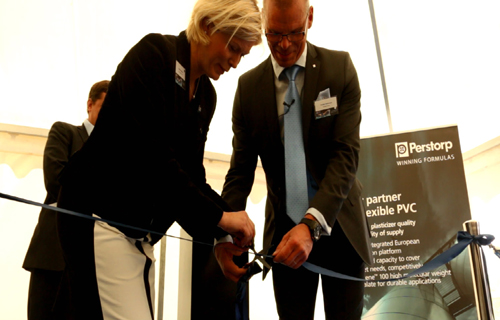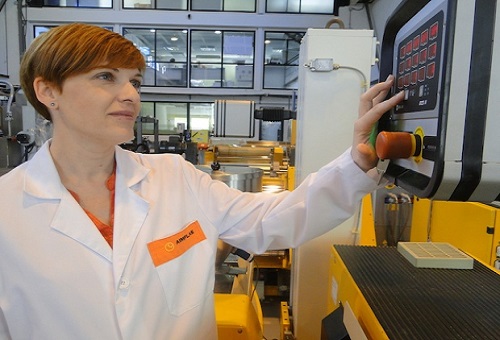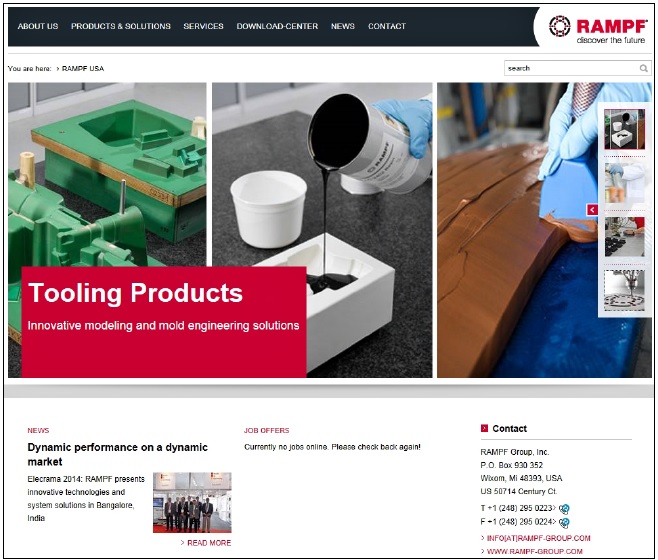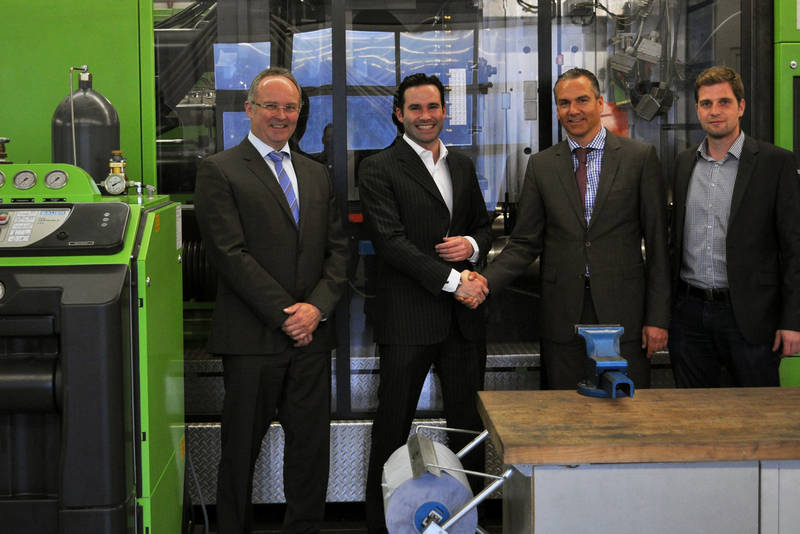Sustainable packaging upstart Ecovative Design LLC has received tremendous attention over the past year for its disruptive technology introduction of protective packaging materials grown from agricultural byproducts bound together by mycelium, or mushroom “roots.” As Sam Harrington, Ecovative sales and marketing, told Packaging World last summer after winning a 2011 Greener Package Award, “The materials we’ve developed … represent the first time humans have capitalized on the amazing structural properties of another kingdom of biology: fungi.”
To bring this unprecedented material to market, not only did Ecovative have to learn how to harness a biological process for the purpose of creating a revolutionary packaging material, but it also had to develop custom machinery and tools to “manufacture” the material on a commercial scale. Primary to the manufacturing process are what Ecovative has labeled “thermoformed grow trays.” The grow trays are reusable plastic molds in which the biological material is placed while it grows.
In spring 2010, Ecovative began developing a line of standard-size shipping coolers made from EcoCradle™ Mushroom® Packaging as an alternative to those made from petroleum-based expanded polystyrene. To design and create the molds for this project, the company worked closely with custom thermoformer Dordan Manufacturing. The result was a meticulously engineered a custom grow-tray solution capable of increasing the overall efficiency of Ecovative’s unique manufacturing process.
Production process like nothing else
Formed in 2007, Ecovative operates a pilot production facility in Green Island, NY, that can produce up to 10,000 packaging parts per month. A new, commercial-scale 100,000-part-per-month facility, also in Green Island, is under construction and is expected to open in mid-2012. To date, its most recognizable customers include Dell computers and furniture maker Steelcase, both of which are using EcoCradle for their distribution packaging. Ecovative has also been selling stock packaging for wine shipping and standard-design corner blocks.
The process of creating an EcoCradle part begins when Ecovative combines agricultural waste with mycelium and water into a wet solid. A number of different crop-waste materials can be used for the mixture, such as cotton burrs or oat hulls, depending upon what is regionally available. Once the mixture is formed, Ecovative uses a custom-engineered, automated filling machine to fill the grow trays with the wet material.
Says Harrington of the filler: “The machine was custom-designed and built in-house by our team of engineers. It is one of our most important pieces of equipment and is unlike anything else out there. Not only does it fill these trays, but it also does so in a sanitary, biological way.”
Once the trays are filled, lids are securely snapped onto them, and they are loaded onto racks, where they sit for five to seven days in a dark, indoor environment. During the growing process, the mycelium breaks down the crop waste, self-assembling lignin and cellulose into strong biopolymers and forming a solid packaging part. The grow trays can be configured in virtually any size or shape to create the custom part required. Once the material has grown into the desired shape, it’s removed from the trays and heat-treated to stop the growth.
For packaging parts that need further assembly, like the coolers, before the parts are heat-treated, they are positioned next to one another, and within one day, says Harrington, “live panels assemble themselves together without any glue.”
After use, grow trays are sent through a custom-built wash station, where they are cleaned for reuse.
Optimized tray design
In developing its manufacturing process, Ecovative worked with several thermoformers to produce its grow trays. For the cooler project, it further diversified its supplier base, working with Dordan. Harrington says Ecovative was impressed with Dordan’s engineering-based design capabilities, as well as its proactive approach to sustainable packaging. Since 2009, Dordan sustainability coordinator Chandler Slavin has been an aggressive and vocal advocate for developing the systems and infrastructure required to recycle non-bottle rigid PET, such as the thermoforms produced at Dordan.

“I have been really impressed with Chandler’s efforts at trying to get thermoforms recycled,” says Harrington. “I think it’s very important work. It certainly had an influence on us in deciding to go with them. Eventually, we will recycle these grow trays, and I think it’s a noble goal to extend that to consumers.”
According to Slavin, when Ecovative approached Woodstock-based family-owned and operated Dordan, it had three main requirements for the design of the cooler grow trays. It specified:
• Part geometries that could be easily integrated into its existing filling, growing, and washing processes and that could be easily modified pending alterations to its production processes.
• A structurally rigid design that would reduce the likelihood of bowing between tray and lid.
• Aggressive denest features that would not compromise the real estate of the tray cavities.
Adds Harrington, “The grow trays also needed to support the wet EcoCradle substrate while it grows, seal properly with the lid, and be reused at least 100 times on average before wearing out.”
Dordan general manager John Kreider collaborated closely with Ecovative to research and develop a number of concepts that could address these requirements, while bearing in mind thermoforming’s limitations. Thoroughly investigated, explains Slavin, was the feasibility of creating a standardized tooling scheme aimed at reducing overall tooling costs through the integration of a universal base with modular cavities.
The resulting design is one that uses a standard, 21 x 21-in. base and lid, with tooling customized for different cavity sizes within the trays. Explains Harrington, “We have designed the grow tray in such a way that we are not remaking that common base every time. We are just making the cavity, and bolting it on. It involves slightly more machining to start with, but it saves a lot of costs and is simpler in the long run.” The trays are thermoformed on an in-line, PC-controlled thermoformer from Lyle Industries, Inc.—one of 11 at the facility.
The trays are made from 60-mil PETG and include three shallow cavities and a design embossed on the lid with the Ecovative name and mushroom-shaped logo. Each grow tray produces the parts for one-half of a cooler.
Challenges addressed
The resulting trays meet virtually all of Ecovative’s requirements, but the project did not come without challenges. Says Slavin, “Ecovative’s process is constantly evolving to allow for increased production capacity. As such, Dordan designed the cooler tray to be compatible with Ecovative’s current and future production requirements. Designing something for future requirements always has its limitations, insofar as assumptions must be made. In discussions of engineering, this always makes people hesitant.”
Another challenge she cited was that the crop-waste material used in the production of EcoCradle parts will change, depending upon availability, and each material has its own shrinkage rate. “Therefore, the trays had to be designed in coordination with the substrate shrinkage rate, which wasn’t an exact science,” she explains.
Another design difficulty was that the trays had to withstand extremely heavy load stacking, so robust denest features had to be engineered to be even more aggressive. And, based on the previously defined structure of the grow trays, bowing become unavoidable to some extent. “Dordan and Ecovative continue to collaborate on how to solve this problem,” Slavin remarks.
Mutual respect
At the completion of the project, Harrington says Ecovative was very happy with Dordan’s expertise. “I am constantly learning what is possible with thermoforming,” he says. “Unlike a lot of engineering processes, thermoforming is a little bit of an art form, so I have a lot of respect for the designers and engineers at Dordan. They really have this deeper understanding that you can only get through experience.
“Dordan also has one of the most professional and cleanest shops I have ever seen,” he adds. “They have a nice layout and nice equipment.”
Concurs Slavin, “We have a great working relationship with all of Ecovative’s engineers based on the establishment of a systems-based approach to understanding their grow-tray design problems in the context of total production processes.”
Source : www.packworld.com







